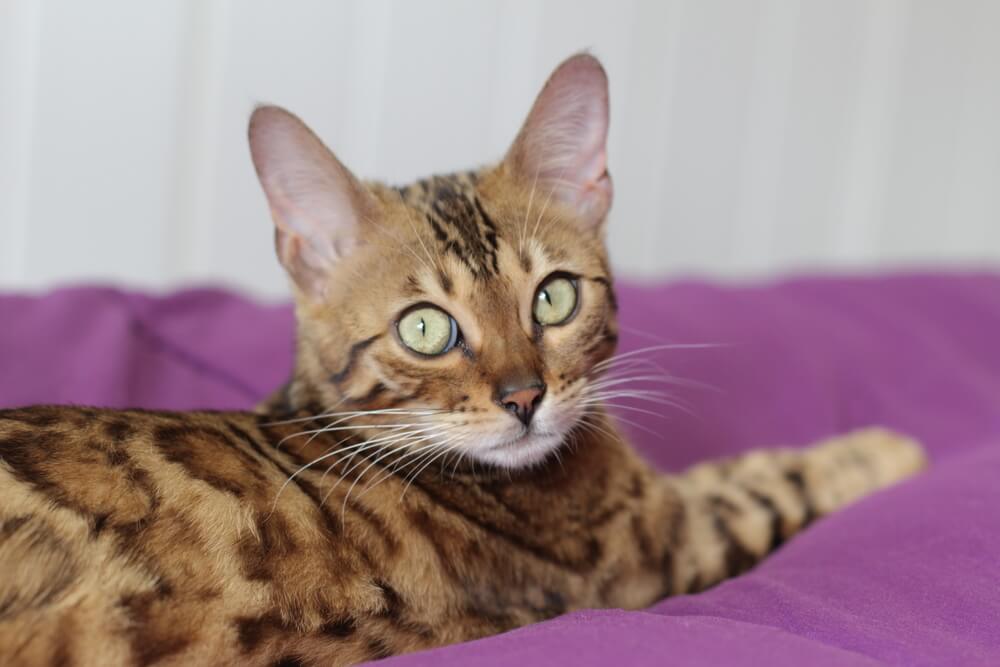There are a few common behavior problems that are seen in Bengal cats. Some of these behavior Problems in Bengals include:
- Hissing and growling. This behavior is often seen when Bengal cats feel threatened or frightened. It is their way of trying to make themselves appear bigger and more intimidating to scare off whatever is causing them to feel this way.
- Biting. Some Bengal cats may resort to biting as a form of aggression. This can be directed toward people or other animals. If your Bengal cat is exhibiting this behavior, it is important to seek professional help.
- Spraying. Both male and female Bengal cats can spray urine to mark their territory. This behavior is often seen when new cats are in the home or when Bengal cats feel threatened by something in their environment.
- Destructive scratching. Some Bengal cats may scratch furniture or other items in the home out of boredom or frustration. This behavior can be destructive and should be addressed with positive reinforcement and training.
If you notice any of these Behavior Problems in your Bengal cat, it is essential to seek professional help to address the issue. A qualified veterinarian or animal behaviorist can help you determine the cause of the problem and devise a plan to correct it.
Can Bengal Cats Get Depressed?
Depression is a common mental health disorder that affects people of all ages. While it is unclear what causes depression, it is believed to be the result of a combination of genetic and environmental factors.
While depression is not often thought of as affecting animals, there is evidence to suggest that some animals, including cats, can suffer from this condition. Bengal cats are no exception.
There are several potential signs that your Bengal cat may be depressed. These include a loss of interest in food or play, sleeping more than usual, withdrawing from social interaction, and exhibiting signs of anxiety or stress.
You must talk to your veterinarian if you think your Bengal cat may be depressed. They can help you determine if your cat is indeed suffering from depression and, if so, develop a treatment plan.
With proper care and treatment, most cats with depression can live happy and healthy lives.
Do Bengal Cats Like To Be Held?
No, Bengal cats do not like to be held. They prefer to be left to their own devices. If you must hold your Bengal cat, make sure to support its hind end. Never pick up a Bengal cat by the scruff of the neck, as this can injure them.
Apart from that, Bengal cats are generally very friendly and loving creatures. They love to play and be around people. If you want to hold your Bengal cat, it is best to do so while they are sleeping, as they will be more relaxed.
Why Do Bengal Cats Scream?
Bengal cats are known for their distinctive vocalizations, including chirping, trilling, and screaming. While some people find these noises charming, others may find them irritating or even alarming.
So why do Bengal cats scream? There are a few different reasons why your Bengal cat may be letting out blood-curdling screams. It could be that they’re in pain or discomfort, feeling threatened or scared, trying to get your attention, or just communicating excitement or happiness.
If your Bengal cat is screaming excessively, take them to the vet to rule out any medical causes. Once you’ve ruled out any health concerns, there are a few things you can do to help lessen your Bengal’s screaming.
Try providing them with more opportunities to climb and scratch, which can help them release excess energy. You can also try training your Bengals with positive reinforcement, rewarding them when they make quiet vocalizations instead of loud ones.
Finally, ensure you provide enough mental and physical stimulation through playtime and interactive toys. By understanding the reasons behind your Bengal’s screams, you can help reduce their frequency and keep everyone in your household happy.
How can you tell if your Bengal cat is unhappy or scared?
There are a few key behaviors that may indicate your Bengal cat is unhappy or scared. For example, if your Bengal cat is suddenly hiding more than usual, this may signify they are feeling unsafe.
Another behavior to look out for is excessive grooming, as this can be a sign of stress. Additionally, if your Bengal cat becomes more aggressive than usual, this may also be indicative of an underlying fear or anxiety.
Suppose you notice any of these behaviors in your Bengal cat. In that case, it’s essential to consult a veterinarian to rule out any medical causes and help create a plan to address the behavior.
What should you do if your Bengal cat starts spraying or urinating everywhere?
If your Bengal cat begins spraying or urinating outside of the litter box, this is a sign that they are feeling stressed. It’s crucial to consult with a veterinarian to rule out any medical causes and to help create a plan to address the behavior.
In the meantime, you can reduce your Bengal cat’s stress by providing them with more hiding spots, vertical space, and toys. You should also avoid using punishment to address the behavior, as this will only make your Bengal cat more stressed.














